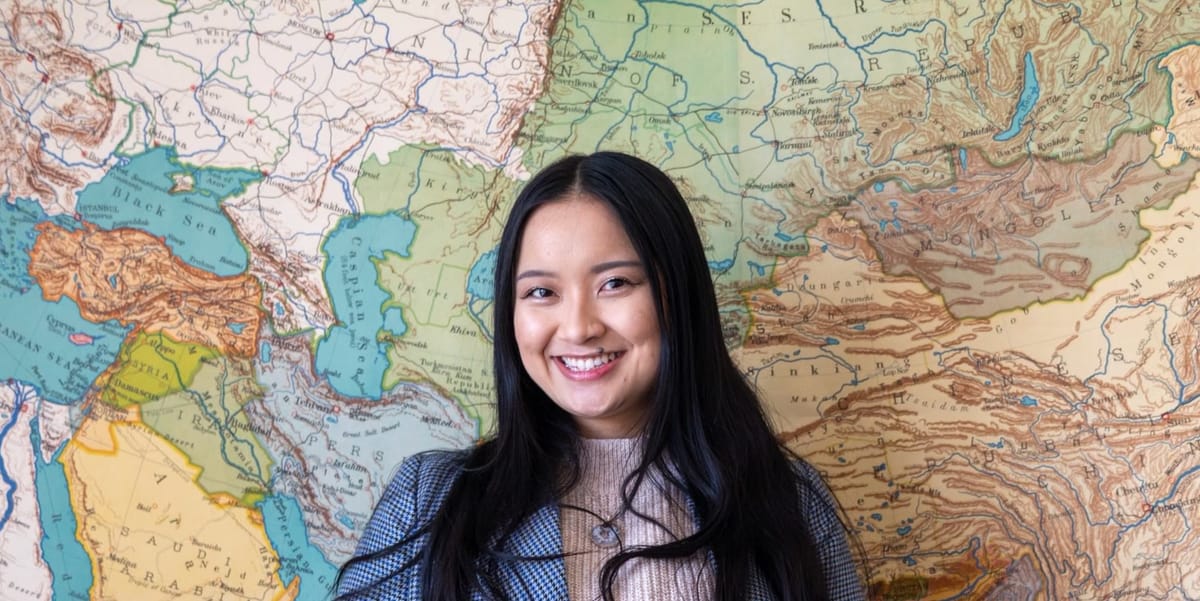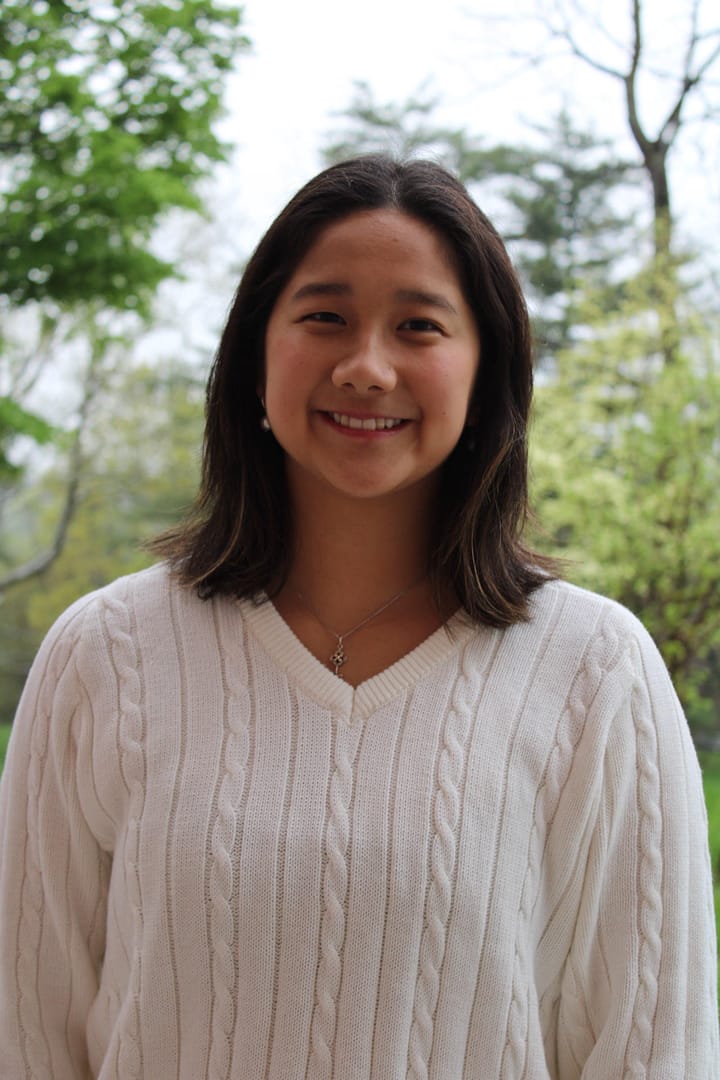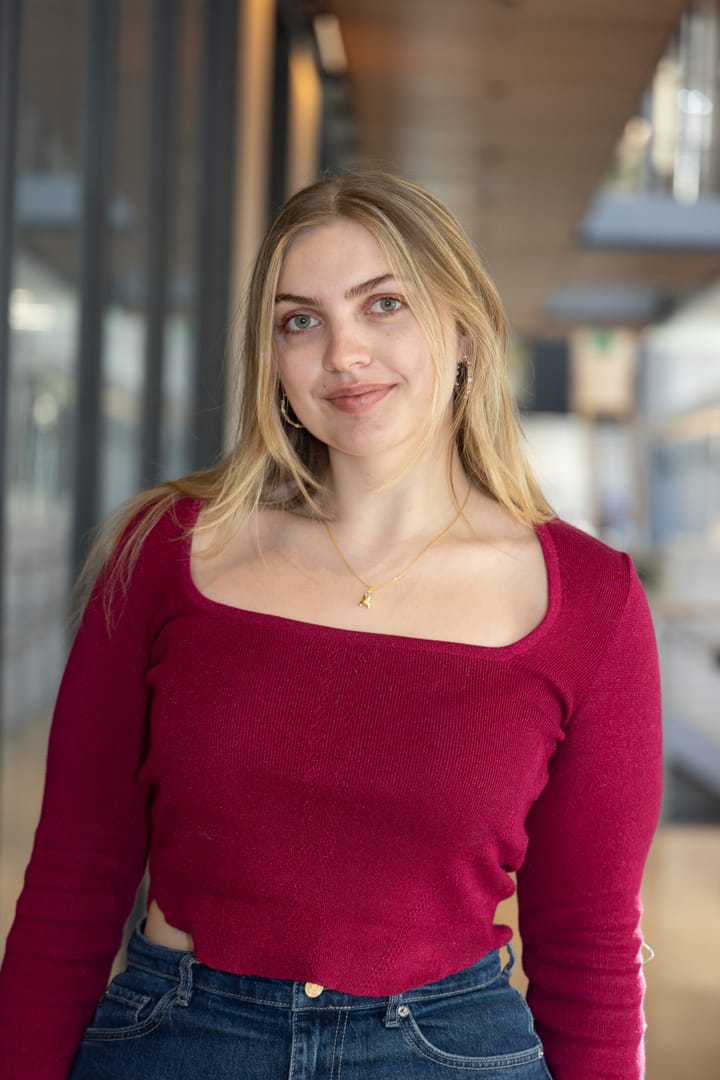Jiajia Zhang: Teaching, Telling, Painting Asian American History
While Jiajia Zhang is on her way to becoming an Asian American studies scholar, her life has encompassed so much more: art, activism, and even social media management for a Belarusian rock band.

From the liberal-arts focus to the open curriculum and the Loeb Center for Career Exploration, Amherst College markets itself as a place for young people who do not yet know what they want to do with their lives. But Jiajia Zhang ’22, an American studies and studio art major, has known that she wanted to be an Asian American studies scholar since she was in seventh grade. Her story, one of fierce and consistent intellectual vision, is a reminder that there is not one kind of Amherst student, and not one kind of Amherst experience.
Zhang was born in Aba Tibetan Prefecture, in Sichuan Province in Western China. She moved to Wuhan when she was two months old, before relocating to Denton, Texas, when she was four-and-a-half years old. In Denton, located in a “working-class part of North Texas,” Zhang was the only child of Chinese ancestry in her public elementary school.
For as long as she can remember, Zhang loved listening to and telling stories. They were “a way to experience solidarity and unpack my contemporary experiences and connect them to the events of the past,” Zhang explained. Naturally, she was interested in the humanities from a young age, but she was typecast by her peers as a “math kid.” When she would speak up in humanities classes, her classmates would make fun of her — she had a stutter. The only Asian person she saw in middle school was an exchange teacher; anytime the teacher tried to speak about anything besides math, Zhang’s peers would snicker. From this early experience, Zhang began to think that a person like her did not belong in the humanities. “It was those kinds of memories that made me feel like it was impossible for me to become a historian,” she said.
But as Zhang grew older, things changed. In seventh grade, one teacher changed her life. She was assigned to read the book “Journey to Topaz” by Yoshiko Uchida, which tells the story of a young Japanese girl sent to an internment camp during World War II. Though Zhang is not Japanese, the book resonated deeply with her. “I remember reading that book and realizing for the first time [that] I had a right to complain and stand up for myself because this entire time, I had felt that everyone else had roots in this country [except for me].”
She had learned about Black history and Latino history, but never about Asian American history. As she began to study Asian American history on her own, Zhang realized that “we’d been coming in waves for centuries, that we had been protesting and standing up for rights for as long as we’d been here.” She retains a close relationship with the teacher who assigned the book to this day.
As Zhang, then still in middle school, began to learn about the stories of the generations of Asian Americans who had come before her, she also desired to share them with others. She had had a passion for teaching from a young age. In second grade, she began teaching Chinese lessons to children at her local library, the same library where a volunteer from the local community had taught her to speak English. As her interests combined, a new dream emerged — to teach Asian American history.
From that point, Zhang set out to learn as much as she could about that history. Because there were few books catering specifically to children, she dove straight into the academic literature, discovering the discipline of Asian American studies. One of the early books she read was “The Columbia Documentary History of the Asian American Experience,” a 620-page survey of Asian American history written by John Woodruff Simpson Lecturer Franklin S. Odo, who Zhang described as “one of the founding fathers of Asian American studies” and who has been teaching at Amherst since 2015.
Though there were a number of reasons why Zhang ultimately chose Amherst, the prospect of studying with Odo was a major one. Odo remembers his first interaction with Zhang, while she was still a high-school senior making her college decision. “She introduced herself and said, ‘I want to be an Asian American studies professor,’” he said. “That about floored me. How many high school kids know what they want to be in the first place? And how many kids want to be an Asian American studies professor?”
It was the beginning of a four-year working relationship between the two. Zhang said that she worked with Odo, either in classes he taught or in special topics courses, during each of her eight semesters at Amherst.
While at Amherst, Zhang has not only studied Asian American history, but advocated for it. She served as president of Amherst’s Asian and Pacific American Action Committee, leading protests and facilitating dialogue with the administration in hopes of establishing an Asian American studies department at Amherst and organizing the “Stop Asian Hate” protest in March of last year. The campaign is already showing results in the form of the hiring of three new Asian American studies professors, but the administration has not yet committed to establishing a department.
Odo celebrated Zhang’s activism and her academic prowess; he said that, from the beginning, he could tell that Zhang was “unusually intellectually mature.” But his favorite part of the relationship has been that he “keeps learning things about her.”
Such is the experience of getting to know Zhang. Though her intellectual life has long been anchored by a love for Asian American history, she seems to have an almost infinite array of interests and talents.
She was a competitive figure skater growing up. She is an exceptionally talented artist; she recently sold one of her works to the college’s Mead Art Museum. She sang in Amherst’s Choral Society. When she was in middle school, she began managing the English-language social media accounts of the Belarusian pop rock band Litesound.
Nevertheless, during her last year at Amherst, Zhang focused on that passion she discovered all the way back in seventh grade: Asian American history, working on theses in both the American studies and art departments. Her American studies thesis focused on the discriminatory practices faced by Chinese sailors in Norway, England, and the United States during World War II, with a central goal of understanding “Chinese Exclusion” as more than simply a legislative era in the United States, but a trans-national movement. In order to access texts that had never been translated to English, Zhang learned Norwegian to complete the project.
She explored similar themes in an thesis titled “This Too Was Violence: A Critical Autopsy of Asian American Suicide;” Zhang’s goal was to connect images of lynchings during the Chinese Exclusion era to present-day Asian American suicides.
Though the top-line resume items might not show it, Zhang made sure to emphasize in our conversation that, even though she has enjoyed academic success and a sense of intellectual purpose, her time at Amherst has not always been easy. She was open about going through mental health struggles and facing relationship issues that distracted her from her studies. Earlier this semester, she had a bout of Covid that Amherst employees described as “the most serious case they had seen.”
Most consequentially, she broke her wrist on her dominant right hand while ice skating midway through the semester. She couldn’t type for a week. She still cannot comfortably hold a pencil. She had to type parts of her American studies thesis with just her left hand. When she was finally able to type normally, she could only work for an hour at a time because the pain was so severe. Nevertheless, she got the American studies thesis in on time, turning in a project that Odo described as a legitimate “contribution to the field.” He said that it’s the kind of work that would be impressive for a graduate student.
Though she was originally told by the doctor that she would be able to complete her art thesis, drawing ended up being too painful. Zhang initially tried to make up for her lost time after getting her brace off, but ultimately could not bear the pain. She ended up dropping the thesis, a project she had been thinking about since sophomore year. Zhang described walking by the completed art theses in Fayerweather Hall, knowing her half-completed work would never receive the same recognition, as one of the most difficult moments of her college experience.
Through the disappointment, Zhang made it clear that art will continue to be a part of her life. She sees herself continuing to engage in a private practice and perhaps selling some of her works.
Overall, whether she is operating as an artist, a historian, or an activist, Zhang’s experience is best described with two words: stories and mentors.
It was those early stories of the Asian American experience that ignited her passion for Asian American history. Her art seeks to highlight the stories of individual Asian Americans throughout history. She holds personal stories at the heart of what it means to be a historian: Her American studies thesis sought to redefine “Chinese exclusion” based on lived experiences, not acts of Congress.
Zhang also credits her mentors with making her the person she is today. They taught her English, taught her that she, and people like her, deserve to have their stories told. She says that the reason she engages in activism, the reason she has fought so hard to establish a department of Asian American studies at Amherst, is to ensure that future generations of Asian students can have the same experiences that she has had.
And perhaps, one day not too far in the future, she will serve as one of those mentors. She will attend Oxford University next year, seeking a master’s degree in history. She hopes, from there, to pursue a career in academia. She admitted that her ultimate goal is to return to Amherst, to teach in a newly-created Asian American studies program — instituted, she hopes, thanks to her own activism, and the future waves she has inspired.





Comments ()